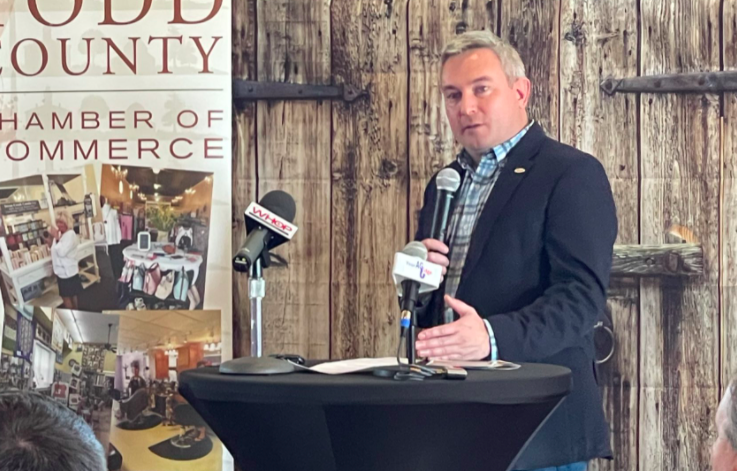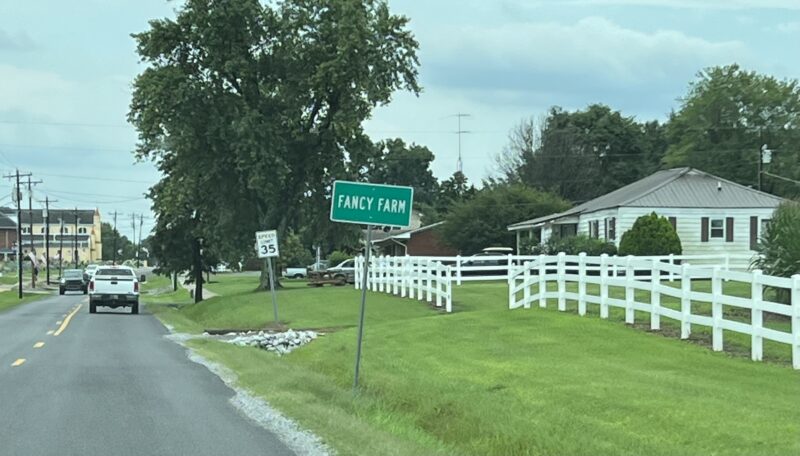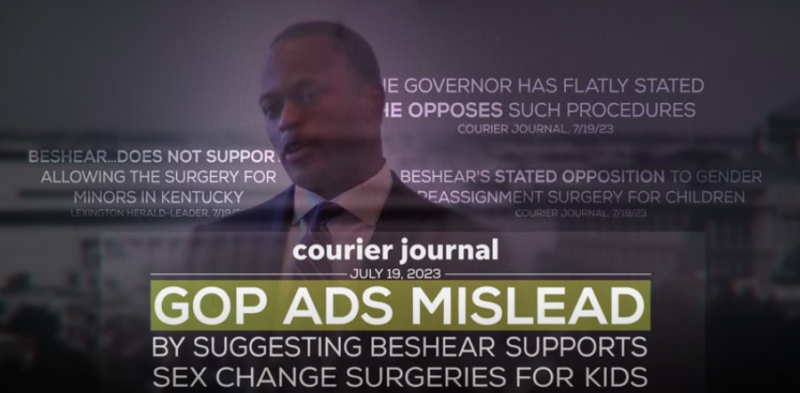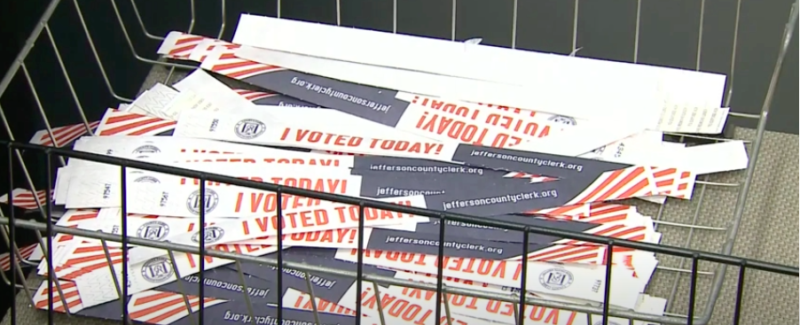Op-Ed By T.J. Hensley
In a recent opinion article for Kentucky Fried Politics, Agriculture Commissioner Ryan Quarles laid out what he termed a “Commonsense Plan” of taxation for Kentucky as he seeks the Republican nomination to take on Governor Andy Beshear in the fall election. Given that Commissioner Quarles is touted among the three or four candidates with a real shot at capturing the GOP nomination (let’s not forget that there are twelve candidates in that primary; thank goodness my side of the aisle doesn’t have to worry about a primary this year—no telling what we would do with ourselves), the Commissioner’s plan deserves serious consideration and critique. That’s what I aim to do through this article, and hopefully, these observations will better enable voters (the real deciders of any election) to determine for themselves how commonsense this plan is.
Now, before I am accused of simply being a partisan hack who wishes to attack every word the Commissioner wrote simply because he belongs to a different party than I do (if I were such a character then I could never again sit through another family Thanksgiving meal and Lord knows I love my Mammaw and her cooking too much to let that happen), let me say that there are points in the Commissioner’s plan which I agree with. Within the article, the Commissioner writes that, if he is elected Governor, his budget proposals, “will call for 100% of coal severance tax revenues be returned to coal-producing counties”. On this point, the Commissioner and I are in complete agreement. Coming as I do from Harlan County, my community knows well the sacrifices of coal miners across our state, whose courage and sacrifice in the mines contributed not only to the growth of Kentucky but powered industrialization across the United States. It is not only fair but right, that every penny of coal severance taxes be returned to the communities which provided the mineral in the first place. I myself am very glad to see that, not only are Commissioner Quarles and I in agreement but that both of us agree with Governor Beshear on this point as well! As a matter of fact, in the two-year budget proposal that he released to the state legislature way back in January of last year, Governor Beshear also called for 100% of coal severance taxes to be returned to coal-producing counties. I must say, I am very glad to see some bipartisanship in how Commissioner Quarles is following Governor Beshear’s leadership on this issue.
Now, I would add a measure to the plan that I feel is missing. When these funds from severance taxes are returned to coal-producing counties, those very communities should decide how these funds are to be spent. Just as we should remember the dedication of the coal miners, as well as the sacrifices which they and their families have made in serving our Commonwealth and our nation, we must remember as well that, without those very miners, there would be no coal mined, no profits for coal companies, and no revenue for the state. As such, it is both fair and right that when local governments receive funding from returned severance dollars, the folks who live and work in those communities should decide how each penny is spent in a way that betters their county. Perhaps this can be done by a county-wide vote, where citizens decide which initiatives or programs need the funding most immediately. Perhaps some other sort of deliberative process could be implemented. The end result, however, should be the same: the people who live and work in these places, the people who produced that wealth in the first place and who understand better than almost anyone else, the problems which they and their community face, should decide how that money is spent.
Let’s turn our attention to another point in the Commissioner’s plan: eliminating the state income tax. In his article, the Commissioner points out that, “…Republican legislators have steered Kentucky onto a course…which will eventually eliminate the state income tax”. The Commissioner continues that, if he is elected Governor he will, “…help reach that goal by working with the legislature to eliminate the income tax in a responsible way”. Now, there are a few problems with this portion of the Commissioner’s plan.
For one, in terms of funding state government, there is no “responsible” way to completely eliminate the income tax for Kentucky. According to the Kentucky Economic Policy Institute, the state income tax accounts for 41% of Kentucky’s revenue. And, according to the Urban Institute, the top five categories for spending in Kentucky during Fiscal Year 2020 were: public assistance programs, K-12 education, higher education, health and hospitals, and highways and roads. Now, with almost half of the budget to spend on these projects coming from the state income tax, we appear to have a problem on our hands. With the many challenges facing Kentucky workers as they strive to create a dignified life for themselves and their families, I for one can think of nothing better to spend so much of our revenue on than healthcare and education. Now it is only right that we, as voters and as taxpayers, ask Commissioner Quarles where all that money to fund our roads, schools, and hospitals, is going to come from to replace the eliminated income tax, especially as he claims that this will be done in a “responsible” way (I’d caution him not to worry; take it from someone who has been advocating for the last six years in favor of free healthcare, you get used to people constantly asking how you’ll pay for things). Unfortunately, it seems that Commissioner Quarles does not explain in his opinion article, or on his campaign website, how he would address the revenue lost from eliminating the income tax if he were elected Governor. I must say my friends, this concerns me quite a bit. Given how much of the funding for education, healthcare, and infrastructure in our state is provided through the state income tax, the responsible thing to do would be to present a reliable means to recover that funding when the whole idea of the policy is to eliminate the state income tax, because as we all know, that funding will have to come from somewhere. Why the Commissioner chose to exclude that information from his opinion piece and his campaign website, I cannot say. However, a look at states who have followed similar paths may give us some idea of how this would be done if Kentucky’s income tax were eliminated.
Take our neighbors in Tennessee for instance. While the state does not have an income tax, its sales tax is 7%, higher than Kentucky’s 6%. Or look at Florida (also without an income tax), which has only a 6% sales tax, but an additional local sales tax of up to 2%. It seems that if Kentucky’s income tax were eliminated, an increase in the sales tax would be the most likely way to recover lost revenue, as is the case in these two examples; for instance, Tennessee’s sales tax accounts for more than 66% of the state budget, Florida’s sales tax makes up more than 80% of that state’s budget. We have already seen this occur in Kentucky, as the legislature cut the state income tax to 4%, which the legislature recovered with a 6% sales tax added to more than thirty services in the Commonwealth. Here’s the catch, the increase in the state sales tax would likely have to be even higher than that, given that Kentucky’s population is considerably smaller than both Tennessee and Florida. With fewer people available to help make up the shortfall in revenue, a larger share of the burden will have to be imposed through an increased sales tax (unless of course, the legislature wishes to increase corporate taxes to make up lost revenue, but asking this legislature to increase the corporate tax is like asking my mom to turn the channel when the Vols are playing, it ain’t gonna happen).
Now we’re left to consider who would shoulder most of this burden if the income tax were eliminated, and an increased sales tax or similar measures were passed to make up for revenue. It seems clear to me that the folks who would be most directly harmed by such a move would be working people. One might think that, if the state income tax were eliminated, these folks would be able to keep more of their income; however, seeing as how an increase in the state sales tax would likely follow, it remains to be seen how much of that money these folks would actually see when they are paying more for crucial necessities which themselves are already more expensive due to inflation. Meanwhile, the very wealthy in our state would benefit the most from eliminating the income tax, as these folks would keep more of their income, and be able to weather an increased sales tax much better than workers. It seems clear to me that this aspect of Commissioner Quarles’ plan would harm working people just as much as it would help the very wealthy in our state. Under increased strain from a national economy that for the last fifty years has been designed (by both national Republicans and national Democrats) to benefit the few at the expense of the many, the working people of Kentucky deserve a real tax break, and I have a suggestion on how this might be achieved.
I am in favor of reforming Kentucky’s state income tax system, though in a way that Commissioner Quarles may disagree with. In my view, Kentucky should adopt an income tax rate wherein how much income tax you pay is determined by how much money you make, and the cost of living in your region. This would allow workers to keep more of their hard-earned dollars, it will help ensure that their income will not be significantly harmed by inflation and that regional differences in cost of living are accounted for in a way that makes it easier on workers from eastern Kentucky, all the way to Louisville and everywhere in between. A higher tax imposed on those with large enough incomes may even provide enough sustained revenue that the state is able to lower the sales tax altogether, which would also help workers sustain more of their own income.
Such a system could also be applied to the state inheritance tax, which Commissioner Quarles proposes to eliminate. The state inheritance tax is paid by a person who is receiving property as an inheritance from a deceased person. The actual amount of the tax depends on the recipient’s relationship to the deceased person (for instance, spouses, children, parents, grandchildren, and siblings are exempt from paying an inheritance tax) and the value of the property. I must admit, I did not know that Kentucky imposed such a tax until I read the Commissioner’s article, and so I thank him for bringing my attention to this issue. Here we find another point on which the Commissioner and I may find agreement. While I do not think it would be fiscally responsible to scrap the inheritance tax altogether (again, that money for the state budget will have to come from somewhere) I can see how such a tax could become burdensome when inheriting a small business or a family farm. To lessen this burden, I propose we structure the inheritance tax based mostly on the income and wealth of the person receiving the inheritance (those with less will pay less, and those with more will pay more), and based partly on the value of the inherited property.
Let me say that, I am not an economist or an expert in that field, and there is likely much about these plans that would have to be changed if they were ever implemented (but again, with this legislature, let’s not hold our breath until the TJ Hensley Tax Plan is enacted). But I welcome that conversation, and I welcome the chance to be corrected in matters that I do not fully understand. But in discussing issues like tax policy, which directly impacts every person living and working in Kentucky, we must begin and end with the objective of helping the workers of our state achieve and maintain the kind of dignified life that they deserve. From Harlan County to Graves County, from Newport to Somerset, Lexington to Louisville, workers are the people who keep our state going, and they deserve to share equally in the wealth that would not exist at all without their contributions.
Now, in an ideal world, of course, we would all like not to have to pay taxes (I often have to remind my fellow Democrats that no one likes paying taxes, regardless of how much they make), but like the old saying goes: “can’t live with them, can’t live without them”. As I detailed earlier, most of Kentucky’s revenue (taken in through taxation) is spent on roads, education, healthcare, and important programs that help many even live; this is the entire point of taxation, as Supreme Court Justice Oliver Wendell Holmes (a Republican) wrote in 1927, “Taxes are what we pay for civilized society”. Most of us do not enjoy paying taxes, but in the best possible world, through our shared contribution, we also share in the benefits of highways, hospitals, and schools. In fact, if we were to increase the tax expectation on the wealthy in our state, we might find that we have even more to spend in such important areas. We might find that we can improve our roads and waterways, our schools, and other facilities; we may even find that we can provide more healthcare at a lower cost for everyone, regardless of their income. That is the kind of Kentucky I would like to live in, and I think many of us (regardless of region or political party), would agree. And I think that a tax system that takes into account both the income of taxpayers and their true cost of living, and which is designed to help workers have a better life for themselves and their families, is a commonsense plan to implement.
T.J. Hensley is a senior at Georgetown College in Kentucky, where he is studying Political Science and Philosophy. His opinions are his own. He is the host of the Appalachian Firesides Podcast on Apple and Spotify, in which he discusses subjects related to the politics, culture, and history of Appalachia.




 Login
Login  Must include at least 8 charaters
Must include at least 8 charaters



